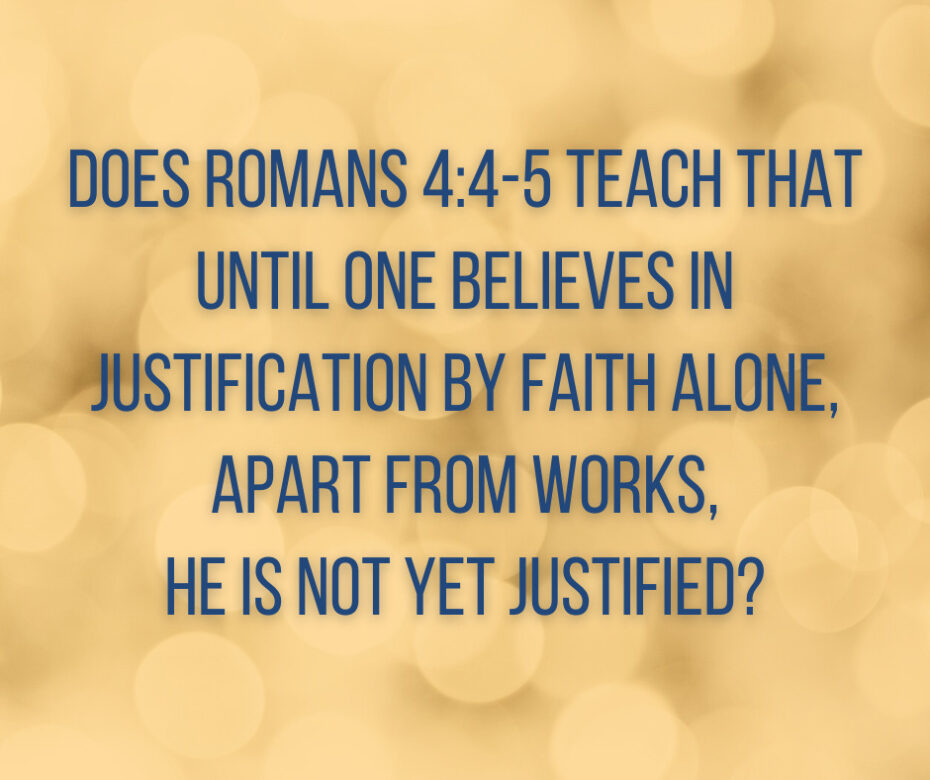In Parts 1 and 2, we saw that works salvation will not result in the regeneration of anyone who believes that message. To be born again one must believe in the Lord Jesus Christ and Him alone for the free gift of everlasting life. Adding works to faith is like adding strychnine to water.
In this third installment I will consider a famous passage of Paul, Rom 4:4-5. Those two verses clearly show that justification by works, like salvation by works, does not work.
After discussing Abraham’s justification by faith alone, Paul wrote, “Now to him who works, the wages are not counted as grace but as debt. But to him who does not work but believes on Him who justifies the ungodly, his faith is accounted for righteousness” (Rom 4:4-5).
Wages are paid for work done. The word used for wages is the NT term for rewards. Believers will be paid wages, or rewards, at the Judgment Seat of Christ, for work we did in this life (2 Cor 5:9-10). But justification and regeneration are not achieved by working for them.
Free gifts are given because of the grace, the good favor, of the giver.
In the case of justification before God, it is “the ungodly,” not the godly, whom He justifies. That does not mean that the person justified is a notorious sinner. It means that none of us is perfect and we cannot be justified on the basis of our works (Rom 3:23). God justifies people on the basis of “believe[ing] on Him,” not working.
The person who believes that God’s justification is by faith and works has tried to make God our Debtor. It is mistakenly thinking that He must justify us and give us salvation if we persevere in a life of faith and good works.
Moo comments, “It is the person who believes in this God, and who thereby in his belief renounces any claim on God that his good works might exert, whose ‘faith is reckoned for righteousness’” (Douglas J. Moo, Romans, p. 264). Notice the words renounces any claim on God that his good works might exert. The person who believes that faith and works are necessary to have everlasting life clearly believes that his good works do give him a claim on God. Compare Rom 4:4-5 with Matt 7:21-23. The person excluded from the kingdom is the person who believes that his works entitle him to that entrance.
Morris agrees, “The believer’s faith is credited as righteousness. This is not to regard it as a meritorious work; it is the very absence of all work, of all claim on God. Whereas systems of justification by works all look to the worshipper to produce the desired righteousness, Paul is speaking of a system that requires him to produce nothing. All he does is to reach out in faith for God’s good gift” (Leon Morris, Romans, p. 199). It is the very absence of all work. Justification by faith alone is antithetical to “justification by works” that requires “the worshipper to produce the desired righteousness.”
Joining the chorus is Mounce: “They are accepted by God as righteous because of their faith. God is under no obligation to pronounce righteous those who would earn his favor by working. Righteousness is a gift. God freely gives it to those who believe. The disparity between legalism and grace is seen most clearly in the way God grants a right standing to people of faith” (Robert H. Mounce, Romans, p. 123).
Justification, like regeneration, is by faith alone, apart from works.
Works salvation, no matter how well intentioned, is a rejection of the free gift. The only way to receive the gift is to believe in the Lord Jesus for it.


